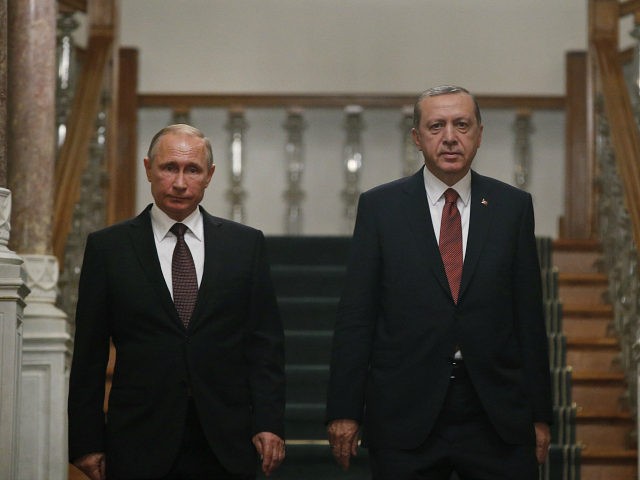Russia, Turkey, and Iran are expected to debate the future of Bashar al-Assad’s tyrannical regime at a critical presidential summit in Russia that will exclude the United States and take place amid what may be the potential end of the six-year-old Syrian war.
“We will hold very important meetings during the [Nov. 22] meetings [in Sochi] that concern the future of our region. Developments in Syria and Iraq that concern us oblige us to produce mechanisms to generate our own solutions,” Turkish President Recep Tayyip Erdogan told the Turkish parliament on Tuesday, referring to the Astana Process, reported Hurriyet Daily News.
The Astana Process “mechanism” that the Turkish president alluded to has already secured a ceasefire between the Syrian army and so-called moderate opposition groups that has partially held since early 2017.
Despite their cooperation, the three participating countries do not see eye-to-eye when it comes to the Assad regime — Iran and Russia have been backing the dictator while Turkey continues to lend support to opposition groups
“Not even an inch of progress has been made for the peace and comfort of either country [Iraq and Syria],” Erdogan recently told lawmakers in his country, reported Hurriyet Daily News, noting that the leader later added, “The al-Assad regime, which has the blood of hundreds of thousands of citizens, remains in place.”
The upcoming summit involving Ankara, Moscow, and Tehran will take place in the Black Sea resort city of Sochi on Wednesday following a meeting between Presidents Vladimir Putin and Assad on Tuesday.
Syrian opposition groups are also expected to participate — the Syrian dictator considers all his opponents to be terrorists, including those backed by Western nations.
The Syrian opposition has reportedly accused Russia of sabotaging United Nations’ efforts at reaching a political solution to the civil war by holding an alternate meeting in Sochi that they believe will mainly benefit the Kremlin’s ally Assad.
Nevertheless, pro-Syrian opposition Turkey is supposed to attend the event.
In December 2016, the Russian Foreign Ministry described Russia’s cooperation with Iran and Turkey as “guarantors” of a peace deal.
Moreover, the countries are engaged in a process of establishing de-escalation zones in various parts of Syria that have failed at times.
While the Syrian conflict continues to drive NATO allies U.S. and Turkey apart, the relationship between Moscow, Ankara, and Tehran has improved in recent months.
Russia, Turkey, and Iran have been working on resolving the Syrian conflict for months.
“Although we still have disagreements on some issues, the results we have yielded as a result of our close cooperation with Russia are quite significant,” declared Erdogan, adding that Ankara is satisfied with Iran’s “increasing respect for Turkey’s sensitivities in the Syrian field.”
During the meeting between Putin and Assad on Tuesday, Russia expressed support for keeping the Syrian dictator in power, a position echoed by Iran.
Nevertheless, Assad claim he is willing “to work with any country ready to contribute to the political solution as long as it is based on the Syrian sovereignty and the Syrian decision,” reported the state-controlled Syrian Arab News Agency (SANA).
Although the United States has been excluded from Syria peace negotiations between Russia, Turkey, and Iran, Putin said he would reach out to America.
Military support from Iran and Russia allowed the Syrian dictator to remain in power despite the atrocities he committed against his own people, including the multiple use of chemical weapons.
The United States has long been against Assad, but has refused to substantially target forces loyal to the Syrian dictator, aside from few military clashes.
In Syria, U.S. troops have almost exclusively focused on combating the Islamic State (ISIS/ISIL) and to a lesser extent al-Qaeda, which has capitalized on the conflict to grow stronger.
ISIS’ so-called caliphate in Iraq and Syria is deteriorating, prompting Iran and its narco-terrorist proxy Hezbollah to declare victory over ISIS in the country.
However, al-Qaeda is believed to be stronger in Syria than in any other country.

COMMENTS
Please let us know if you're having issues with commenting.